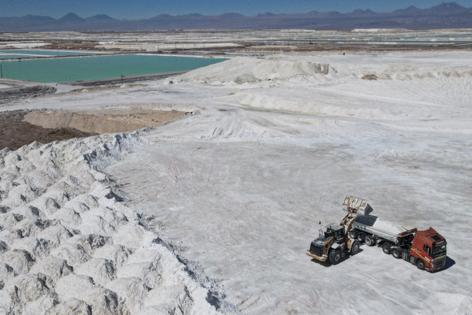US in talks to set up $5 billion fund for critical mineral deals
Published in News & Features
The U.S. is in talks to set up a $5 billion fund to invest in mining, in what would be the government’s most significant foray into dealmaking to boost supplies of critical minerals.
The U.S. International Development Finance Corp. is in discussions to establish the fund as a joint venture with New York-based investment firm Orion Resource Partners, according to people familiar with the matter, who asked not to be identified because the talks are private. Key details are still being negotiated, and there’s no certainty a deal will be agreed, they said.
Trump has touted the prospect of minerals deals in Ukraine and Greenland, while the White House is also keen to promote U.S. investment into the Democratic Republic of Congo’s mining industry. But the joint fund with Orion, if it is finalized, would provide a new avenue for the U.S. government to engage in large-scale deals itself.
The Trump administration has made it a priority to shore up access to critical minerals such as copper, cobalt and rare earths. The logic behind the potential collaboration between the DFC and Orion is widespread anxiety about supply.
In the near term, concerns are fixed on China, which processes the bulk of a wide range of minerals from copper to antimony, while Chinese companies continue to snap up overseas mining assets to feed facilities at home. In the longer run, deep shortages are forecast for some metals due to insufficient investment, declining grades and protracted permitting processes.
A representative for Orion declined to comment. A DFC official declined to comment on potential projects, but said it is seeking collaboration with both private sector partners and host governments in eligible countries.
Created towards the end of Trump’s first term, the DFC has already approved multiple investments in the mining industry, via credit, equity stakes and technical assistance grants. That includes a loan of $150 million to support Syrah Resources Ltd., which operates a graphite mine in Mozambique and has a deal to supply the battery material to Tesla Inc.
During Joe Biden’s presidency, the DFC also committed more than $550 million in financing to upgrade the Lobito Corridor’s railway infrastructure, which transports minerals from central Africa’s copper-belt to an Atlantic port in Angola. If the DFC was to commit the full $2.5 billion, the venture with Orion could rank as the largest in the agency’s history, government data indicate.
Orion is a major financier to the mining industry, with about $8 billion in assets under management and a business spanning private equity, private credit, venture capital and commodity trading.
The partnership being considered would see both parties provide the same amount of money, scaling up over time towards a combined total of about $5 billion, the people said. The structure would be similar to the $1.2 billion venture that Orion announced earlier this year with Abu Dhabi sovereign wealth fund ADQ, according to one of the people.
Orion’s chief executive officer, Oskar Lewnowski, has previously told Bloomberg News that nation states need to take a more active role in critical minerals markets, and urged them to follow China’s example by building strategic stockpiles as a buffer against supply shocks.
Last month, the Department of Defense launched its first tender to stockpile cobalt since the end of the Cold War. In July, the Pentagon also made a landmark $400 million investment in U.S. rare-earths producer MP Materials, and struck a supply deal with a guaranteed floor price to protect the firm’s profits during market downswings.
Orion is already in talks to buy a copper-cobalt miner in Congo that’s become a symbol of the growing competition for mineral deals between the U.S. and China. The central African country is the world’s biggest producer of cobalt and second-largest source of copper, with output of both metals surging in recent years after investments by Chinese miners.
Lewnowski’s firm has teamed up with Virtus Minerals — which is run by veterans of the U.S. military and intelligence services — to bid for Chemaf Resources Ltd, Bloomberg News reported in July.
A previous deal for a unit of Chinese state-owned arms manufacturer Norinco Group to acquire Chemaf was abandoned because Congo withheld the necessary approvals, while U.S. officials also urged President Felix Tshisekedi’s administration to prevent the transfer to the Chinese firm.
The DFC is set to become a more important part of U.S. foreign and economic policy in Trump’s second term, with the White House seeking to double or triple its investment capacity through a reauthorization process expected to happen next month. The organization is also expected to gain flexibility to invest in wealthier countries and take on riskier projects so it can attract more private-sector backers.
Trump picked Ben Black — the son of billionaire Apollo Global Management Inc. co-founder Leon Black — to lead the DFC in January, but the Senate is yet to approve the appointment. In his confirmation hearing three months ago, the younger Black told lawmakers that the federal agency “should never be crowding out private capital” and must have more exposure to New York City financial firms.
(With assistance from Joe Deaux.)
©2025 Bloomberg L.P. Visit bloomberg.com. Distributed by Tribune Content Agency, LLC.







Comments